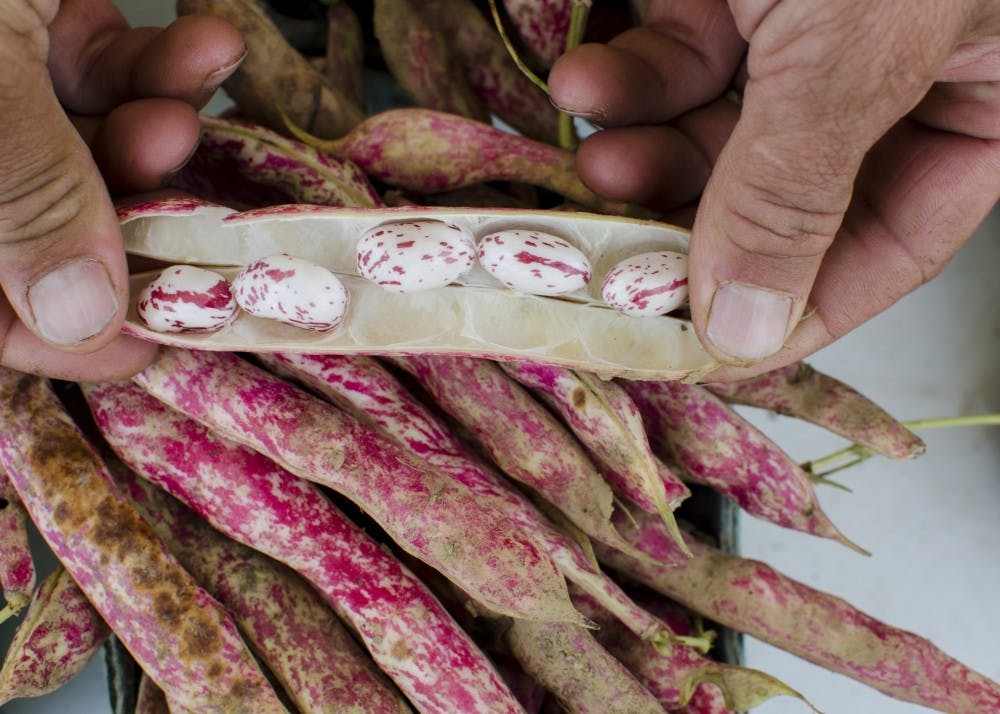Almost 60 percent of Bloomington residents are IU students, but Tracy Hunter, owner of Hunter’s Honey Farm, estimates they make up only 5 percent of his customer base.
“The IU market can definitely be a hard one to crack,” he said.
IU students have access to Hunter’s honey through the farmers' market, Bloomingfoods and Soma coffeehouses. Hunter also tried to reach out to Purdue University to sell his honey on campus but couldn’t because a wholesale distributor provided the university’s honey.
Hunter said these large companies provide universities with products like honey at a lower price, which make them harder to compete with. He said these products are lower quality and not sustainable or locally produced.
"We need to educate the consumer on the value of a local product,” he said. “Once they understand that, the price becomes less of an issue."
Alex Crowley, Bloomington's director of economic and sustainable development, said locally produced food does not have to be more expensive. He said the higher prices are partly because local farmers have to pay for their own gas, trucks and transportation.
If farmers work together, collect food from multiple farms and send them to markets in larger batches, it would be cheaper, he said.
Crowley said farmers have to increase prices because they may not have a predictable customer base that a partnership or presence at IU would provide.
“If Farmer Bob doesn’t know if he’ll sell all his tomatoes, he has to raise prices to $1 to survive,” he said. “If he has a regular customer base through students or IU, he can bring that down to 50 cents and be OK.”
Crowley said companies like Coca-Cola have monopolies at IU and beat out any competitors on campus.
He said one instance of this was when Uel Zing, a local coffee place, could not get its canned iced coffee on campus because of similar Coca-Cola products.
Crowley said part of the reason why local farmers may not be able to compete with monopolies for spaces on campuses is because of their size.
“People at IU are probably thinking, ‘Farmer Bob is great, but he can’t meet my supply needs,'” he said. “'I need to feed 50,000 people a day.'”
Susan Welsand, owner of the Chile Woman, a Bloomington chile farm, has been approached about selling her peppers at dining halls, but she said it is not feasible as she grows over 2,000 chile pepper varieties.
“I don’t grow anything in bulk,” she said. “I grow a little of this, a little of that, a little of this, a little of that, so it’s impractical to supply a large kitchen when you can’t guarantee what they’ll have week to week.”
Hunter said he has considered working with his beekeeper friends to supply universities with honey, if universities like IU would be open to giving him market space to do so.
While supplying a whole university may seem intimidating to a small beekeeper, he said it is definitely possible if they work together.
“Beekeepers working together is always a great idea,” he said. “It gives the beekeepers an outlet for their product, and it gives the university students and staff access to good, local, pure, natural honey.”
Wesland said she often participated in Big Red Eats Green, an event to help students find local food options.
But this year, she said she was disappointed to see the outreach event was canceled. She suggested having a similar event as part of First Thursdays.
Wesland said she wishes the farmers' market would directly reach out to IU students by tapping into social media, spreading awareness to remove what she calls "the Kirkwood barrier."
“A lot of students never go beyond Kirkwood at maybe the courthouse, so a lot of them are surprised to find out about the bigger picture of Bloomington and all the local foods it has to offer,” she said. “We want them to cross the barrier and get past the edge of the social scene.”
Sean McKinney, owner of Barnhouse Farms, said he thinks a farmers' market at Dunn Meadow would be a good way to get into the IU market.
He said allowing students to use Campus Access at the farmers' market, like they can at Kroger, would help as well.
Hunter said one-on-one interaction with farmers widens their customer base and gets consumers to make better choices. He said large institutions like IU should also reach out to local farmers to give them a chance to present their products.
“I don’t care where you get your honey, as long as you know the beekeeper’s face,” he said. “If the purchasing department at IU would talk to a beekeeper, visit a honey farm and know their beekeeper’s face, they may pay a little more for a better product.”




